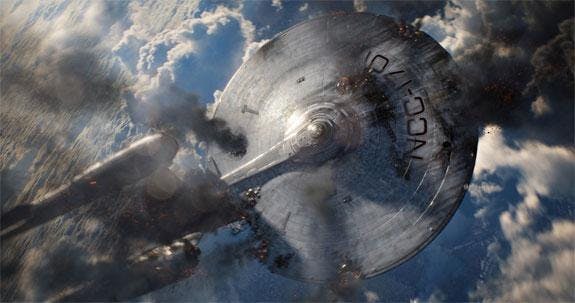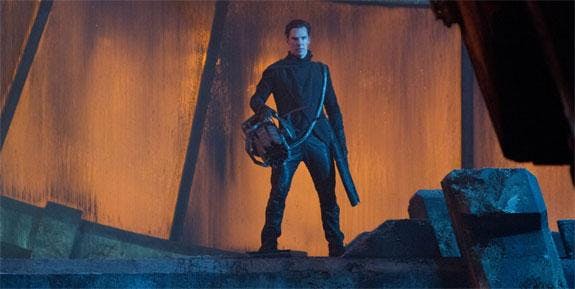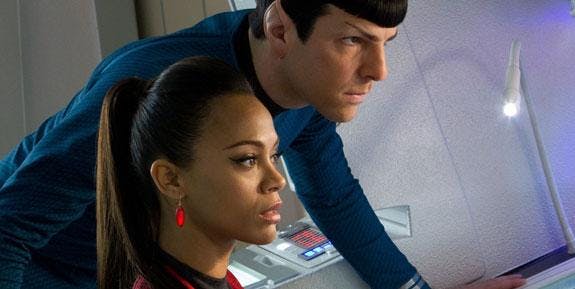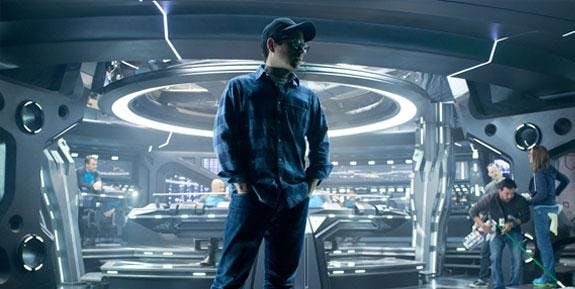Published May 9, 2013
EXCLUSIVE INTERVIEW: Roberto Orci And Alex Kurtzman
EXCLUSIVE INTERVIEW: Roberto Orci And Alex Kurtzman

Roberto Orci and Alex Kurtzman are best pals and longtime writing and producing partners. Together, they’ve worked on everything from Alias, Transformers and Mission: Impossible III to Fringe, Cowboys & Aliens and Star Trek (2009). On the way are the big-screen projects Van Helsing and The Amazing Spider-Man 2, as well as the TV show Sleepy Hollow. Right now, though, Orci and Kurtzman are back in Trek mode, doing their part to promote Star Trek Into Darkness. StarTrek.com engaged them in the following joint conversation, which is spoiler-free. Keep an eye on StarTrek.com for a separate and new Orci interview after the film has opened, in which he’ll address Star Trek Into Darkness matters he can’t yet discuss.

Were you at all worried that four years between Star Trek films was too long?Orci: From a business standpoint, maybe. From a creative standpoint, certainly not. Our job is to make sure that we put out the best movie we can, the movie that will excite us the most as fans.Kurtzman: I definitely agree with what Bob just said. I think we all invested an enormous amount of time in making sure that Trek was built on the right foundation. I think the worst mistake that we could have made was to rush it out without feeling that we were on similar ground. It would have felt like a betrayal to the people who appreciated what the first movie was. We would not have felt right about doing that. Orci: And kudos to Paramount for going with us, for not going with the quick, easy business decision, and for nurturing the project.

The trailers and 9 minutes of footage give us some of the juicy bits: stuff blowing up, the Enterprise in the water, the volcano sequence, London under seige, but there's more to the story than that. How did you go about threading the emotional beats in amongst the action?Orci: We never start from a place of action. We always start from a place of emotion, from what the arcs of the characters are, and then the action needs to impact and progress those stories forward. We all have instincts about what we like to see in action sequences, but we can never start from that place. No great story has really started from that place. So, the action sequences evolved from just the flow of the characters and what they needed to go through in the movie.Kurtzman: I guess that’s the tricky part, because you want to make sure that you’re not just shoving in an action sequence. It’s got to, in some way, turn the story or reflect something about the characters. So, in a way, for us, putting in the action can be more challenging than you might think.

The fans are guessing about a lot of elements of this film, none more so than whether John Harrison is really Khan or Gary Mitchell or someone else. Do you get a kick out of that?Orci: Part of it for us is that it’s so rare that you get to walk into a theater these days without knowing absolutely everything about the movie you’re about to see. We miss that. We miss that as an experience of our childhood, really. Pre-Internet, you didn’t know what you were walking into. You had no idea that Darth was going to tell Luke he was his father. That sort of experience shapes the way you see movies when it happens. So, part of what we’re trying to do is just protect the joy of wide-eyed wonder when you go to the movies. Also, the story tells itself better this way.Kurtzman: I read some of the chat boards and they say, “Oh, Bob and Alex must be laughing their faces off reading all this,” but it’s actually not true. We read it with great interest, but we’re not laughing at it. It’s like, “Oh, that was a good idea. We should have thrown that in there,” or sometimes you’ll read something and think, “Oh, that’s a totally different theory. That didn’t occur to me. I don’t know, that’s pretty crazy.” So, it’s more with fascination and interest that we read things. We never laugh it off. Our guess is as good as anybody’s. That’s what’s interesting about Star Trek; all of us have the potential to have 40-plus years of expertise on it, so to pretend like we’re the only Ph.d’s on the subject is folly.What’s the collaborative process between the two of you, and also between the two of you and Damon Lindelof?Orci: We all worked pretty closely on the first movie, just in terms of conceiving the foundation of what we needed to do to both reinvent Star Trek and to stay true to what Trek had come before. It was a committee of five from the beginning. And Alex and I have been writing together for 21 years. Most of that has been he and I across the table from each other. So it’s already a conversation, the way we write. To add another band member, as we call it, is natural because our writing doesn’t always entail us just sitting quietly in corners typing away. There actually are transcripts of conversations and sometimes we even record things with our phones, and that in and of itself can become dialogue in a script. So it just became a conversation with three people. Obviously, lining up our schedules has become harder, so sometimes we’d check into a hotel that we’d just use for the day, to get away from all of our phones and all of our lives. We’ll go and order up room service for weeks at a time as we divvy up scenes and talk through it. In terms of working on scenes, we’d do it all kinds of ways. Sometimes we’d split up scenes. Damon would take one, Alex would take one and I would take one. Sometimes we’d write all together. Sometimes Alex and I would write one and pass it to Damon and he’d pass it back. Every scene in the script was worked over 17,000 different ways by all of us.

On the TV series, from TNGto Enterprise, what was written HAD to be shot. The actors could not change a word without approval from the producers upstairs. Was it like that on the set of Star Trek Into Darkness, or were things more fluid?Orci: We didn’t have to shoot this during a writers’ strike, like we did last time, and we couldn’t change anything last time. This time, you could discuss scenes the night before and call audibles. Whenever we saw things where that was going to happen, we’d make sure we were all on set together to do that. But there’s no upstairs or downstairs for us. We, the group that has to deliver these things, we like consensus and we like as many as people to feel like it’s working as possible, particularly those who have to perform it. So it was a much more fluid process. Even though Star Trek is very technical and the story is very technical, the structure is very rigorous – and you can’t have total freedom when you’re designing something this far ahead of time – but certainly within the way things are expressed in the moment, or with the blocking of a shot, we were happy to change things when we could. You’ll see in the Blu-ray and DVD background stuff where, sometimes, we’ll change something in rehearsal and you’ll see one of us holding a computer in front of the actors as they walk so that they can read pages that aren’t even printed yet.Kurtzman: Every single member of that cast is incredibly smart. We had such great conversations with all of them, and their suggestions were, without fail, really good. When you’re sort of up against the clock, as we were when we started production, and they come to you with ideas, their ideas were usually really right. There are so many character arcs, and the actors have to be the biggest advocates for their characters sometimes because it’s easy, when you’re writing 12 characters, to shortchange somebody in a given moment. How much fun was J.J. Abrams having the second time around, and how about the actors?Orci: Imagine, now it’s like an anniversary party instead of the pressure of “Have we all been accepted into these roles and into this combination of actors.” I think I universally heard from everybody what a joyful experience it was for everybody.Kurtzman: I can safely say there wasn’t a day on set when people weren’t having fun. And we’ve been on a lot of sets with a lot of different vibes. This is a very harmonious and very happy set. That’s how J.J. runs it from the top down. There would be moments when we’d be in the middle of a scene and he’d stop and bring the entire crew over to the corner because he’d just found some guy on the Internet who played this amazing music. And he’d brought that guy to set and wanted everybody to hear him play. We had moments like that all the time, and that makes for a very familiar and fun place to work.

Talk about Benedict Cumberbatch, Peter Weller and Alice Eve, and what they brought to the table…Orci: It’s always good to get a little new energy on the set because you don’t want everyone to get too familiar. You want some new talent in there to make sure everybody is bringing their A-game, too. It’s like having guest musicians who are really good at what they do, and it suddenly inserts energy into the process, to say nothing of the fact that, individually, the people we’re talking about were great. I can’t wait for people to see them. We’ve got to ask about J.J. and Star Wars. How shocked were you by the announcement, and what impact might it have on Star Trek?Orci: I read about it online, so that’s how shocked I was. He’s obviously a traitor to Star Trek is really what’s happening. No… Star Wars is what got him into the business. It got a lot of us into the business, Star Wars did. So, for him to be able to a part of it is just joyful, watching that happen to a friend of ours. Star Trek has such a legacy as well that I feel like as long as it continues to be serviced by people who care about it -- the way we all do -- that it will live long and prosper fine.The assumption is that someone in the Bad Robot family will end up directing Star Trek 3. Alex, how interested might you be in possibly doing it?Kurtzman: Wow, that’s a tough question. I think Star Trek has become such a part of us that we will all do whatever we have to protect and to make sure, as Bob said, that it lives long and prospers as well. I haven’t really thought about that yet because we’re still in the throes of finishing this movie, but I’m flattered that you asked. I’m not sure, I guess, is my honest answer, only because I haven’t had time to think about it yet.
